Diplomatic Bluebook 2015
Chapter 2
Japan’s Foreign Policy that Takes a Panoramic Perspective of the World Map
2.Situation of Sub-Saharan Africa
(1) East Africa
A. South Sudan
In South Sudan, factional infighting has been intensifying in the Sudan People’s Liberation Movement (SPLM), the country’s ruling party, and a clash between rival factions of the Presidential Guard occurred in the capital city of Juba on December 15, 2013. Conflict between the government (President Kiir’s group) and anti-government forces (former Vice President Machar’s group) spread to local regions. In January 2014, the Inter-governmental Authority on Development (IGAD), a regional economic community in East Africa, started mediating peace talks toward stabilization of South Sudan. In the consultation, the parties agreed to halt hostilities and form a Transitional Government of National Unity, but the agreement is yet to be fully implemented. As of December 2014, the number of internally displaced persons and refugees reached some 1.91 million. In May 2014, Japan held a “meeting of concerned countries on the situation in South Sudan Etaking the opportunity of the first TICAD V Ministerial Meeting. Ministers of Japan, South Sudan and four neighboring countries (Ethiopia, Kenya, Uganda and Sudan) confirmed cooperation toward settlement of the conflict.
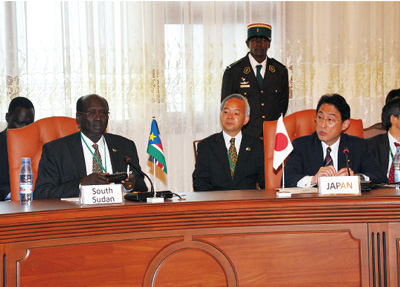 Foreign Minister Kishida attending a meeting of concerned countries on the situation in South Sudan (Yaounde, Cameroon, May 4, 2014)
Foreign Minister Kishida attending a meeting of concerned countries on the situation in South Sudan (Yaounde, Cameroon, May 4, 2014)
B. Djibouti
Djibouti is located at an important point of a major sea route connecting Europe to the Indian Ocean and Asia through the Mediterranean Sea, the Suez Canal and the Red Sea. A terrorist incident by Al Shabab occurred in the city of Djibouti in May 2014, but the government of Djibouti was quick to respond and the situation continues to be stable in the country. The country is an important security hub in the Horn of Africa that is fraught with unstable elements including the situation in Somalia.
Japan has been dispatching JSDF units for Anti-Piracy Operations off the coast of Somalia and in the Gulf of Aden since 2009, making a significant contribution to the decrease in the number of piracy incidents in that sea area. Following the mutual visits by the leaders of Japan and Djibouti in 2013, VIPs from both countries visited each other in 2014 to further deepen the relationship between the two countries.
C. Kenya
In Kenya, Jubilee Coalition between President Kenyatta and Vice President Ruto established in 2013 is stably managing the government and a bold reform towards decentralization is being implemented as a pillar of the new constitution of 2010. In December, the International Criminal Court (ICC) withdew its charges against President Kenyatta concerning the violence occurred after the general election in 2007.
Kenya is Japan’s largest ODA partner in Sub-Saharan Africa. Japan is strengthening relations in various fields with Kenya that is the driving force of politics and economy in East Africa. Negotiations toward the conclusion of a Japan-Kenya investment agreement is also in progress.
D. Somalia
Efforts are under-way in Somalia toward reconstruction from the civil war. The international community confirmed at ministerial meetings in New York and Denmark to provide assistance for the political process scheduled in 2016 and the improvement of public security in the country toward the general election scheduled in 2016. Terrorist activities by the Islamic extremist group Al-Shabaab are continuing with its threat spreading to neighboring countries including Kenya, but Armed Forces of Somalia and African Union Mission in Somalia (AMISOM) are building on their efforts toward stabilization.
Japan invited President Hassan in March. During the bilateral summit meeting, Prime Minister Abe delivered the message that Japan would steadily implement its assistance for Somalia that benefits each and every Somali citizen, including the additional support package totaling approximately 40 million US dollars, resumption of bilateral Grassroots Human Security Grant Aid and enhancement of human resource development assistance.
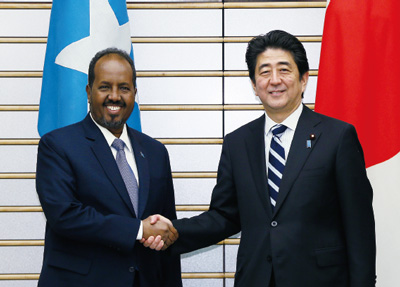 Prime Minister Abe (right) shaking hands with President Hassan of Somalia at Japan-Somalia Summit meeting (Tokyo, March 13, 2014; Source: Cabinet Public Relations Office)
Prime Minister Abe (right) shaking hands with President Hassan of Somalia at Japan-Somalia Summit meeting (Tokyo, March 13, 2014; Source: Cabinet Public Relations Office)
E. Ethiopia
Structural reform of economy and industrialization are progressing smoothly based on the five-year national development plan started in 2010. According to the UN Economic Commission for Africa, Ethiopia achieved the highest real economic growth rate among 54 African countries in five years from 2008 to 2013.
In terms of Japan-Ethiopia relations, efforts were made to deepen economic relations through the visit by the Public and Private Sector Joint Mission for Promoting Trade and Investment in Africa in August, following Prime Minister Abe’s visit to Ethiopia in January 2014. There were exchanges at various levels including the visits in October by a parliamentary delegation led by Speaker Abadulla of the House of Peoples ERepresentatives and family members of the late Abebe Bikila who won gold in the 1964 Olympic marathon held in Tokyo.
F. Tanzania
Tanzania marked the 50th anniversary of the foundation of the United Republic. Thanks to its stable political conditions and economic growth and geographical importance as one of the gateways to Eastern Africa, Tanzania is attracting the attention of foreign countries including Japan as an important trade and investment partner.
As to Japan-Tanzania relations, State Minister for Foreign Affairs Mitsuya visited Tanzania in January, Vice President Bilal visited Japan in May and Their Imperial Highnesses Prince and Princess Akishino visited Tanzania in July, to promote further friendship and cooperation between the two countries. Efforts toward strengthening the trade and investment relations also progressed including the visit of the Public and Private Sector Joint Mission for Promoting Trade and Investment in Africa to Tanzania in August and the first meeting for Japan-Tanzania investment agreement negotiation in December.
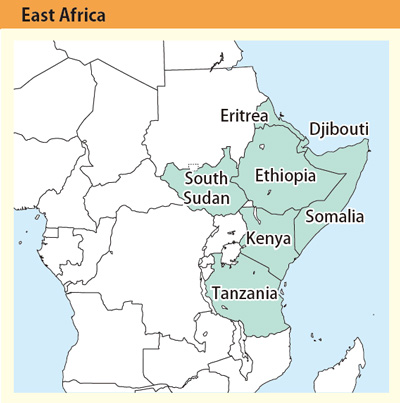
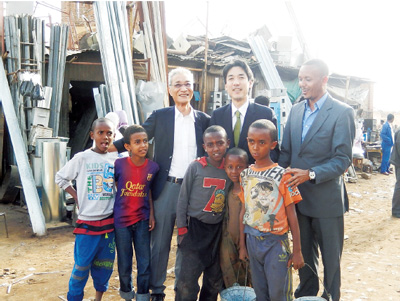 State Minister for Foreign Affairs Kiuchi visiting Asmara, Eritrea (Asmara, September 16)
State Minister for Foreign Affairs Kiuchi visiting Asmara, Eritrea (Asmara, September 16)
(2) South Africa
A. Republic of South Africa
The ruling party, African National Congress, won the general election of the Republic of South Africa in May 2014 and the second Zuma administration was inaugurated. Though its economic growth has slowed down in recent years, many foreign companies are attracted by the big economy in Sub-Saharan Africa as an investment destination and business hub in the Sub-Saharan region.
Taking the opportunity of the G20 Summit Meeting held in Australia in November, Prime Minister Abe and President Zuma had meeting and confirmed to strengthen the strategic cooperative relationship and to collaborate to tackle challenges in the international arena. President Zuma expressed his expectation for Japan’s assistance and contribution from Japanese companies in the field of infrastructure and energy.
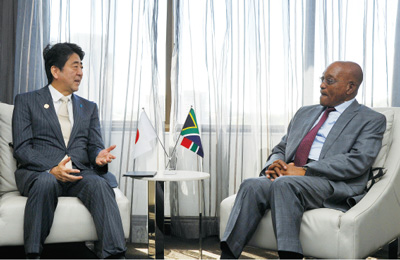 President Zuma of Republic of South Africa and Prime Minister Abe (left) at Japan-South Africa Summit meeting(Brisbane, November 14, 2014; Source: Cabinet Public Relations Office)
President Zuma of Republic of South Africa and Prime Minister Abe (left) at Japan-South Africa Summit meeting(Brisbane, November 14, 2014; Source: Cabinet Public Relations Office)
B. Mozambique
Mozambique has been achieving high economic growth in recent years utilizing its abundant natural resources. A general election was held in October 2014, which the ruling Frelimo Party won and the party’s presidential candidate Nyusi was elected as new president.
When Prime Minister Abe visited Mozambique in January, the leaders of the two countries announced to hold a regular high-level policy dialogue and a public-private joint dialogue in the joint statement. Based on the statement, State Minister for Foreign Affairs Mitsuya had the first dialogue in the capital city of Maputo in July. Through the dialogue, Japan worked toward improvement of the business environment in Mozambique and further facilitation and promotion of investment while maintaining and strengthening the relationship between the two countries. Furthermore, Agreement between the Government of Japan and the Government of the Republic of Mozambique on the Reciprocal Liberalization, Promotion and Protection of Investment came into effect in August as the first such agreement with a Sub-Saharan country.
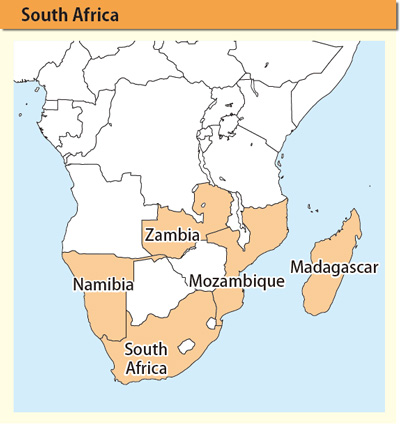
C. Zambia
Thanks to the recovery of the price of copper that is the main export of Zambia, the country has maintained annual economic growth above 6% and now promotes both diversification of industries and attraction of foreign investment as top priority economic policies. Zambia has been generally stable since its independence and marked its 50th independence anniversary in 2014.
Their Imperial Highnesses Prince and Princess Akishino visited Zambia in June to further promote friendship and cooperation between the two countries. In October, Parliamentary Vice-Minister for Foreign Affairs Nakane visited Zambia to attend events for the 50th Independence Anniversary Celebrations (Golden Jubilee) and efforts were made to promote trade and investment. Furthermore, with the passing of President Sata, the Government of Japan extended emergency grant aid for the presidential by-election in January 2015 (approx. 0.64 million US dollars).
D. Madagascar
Political instability continued in Madagascar after a coup in 2009, but a democratic presidential election was held at the end of 2013 electing Rajaonarimampianina as new president in January 2014.
In order to support democratization of the country, Japan provided financial support for implementation of the presidential election and election monitoring. Parliamentary Vice-Minister for Foreign Affairs Ishihara was appointed as a special ambassador and attended the inaugural ceremony of the president and confirmed continuing enhancement of the relationship between the two countries at his meeting with the new president. Later, Japan resumed the new bilateral economic assistance that had been suspended since the coup in 2009.
E. Namibia
Namibia has rich marine and mineral resources and the geographical advantage that can be the gateway to the Atlantic ocean of Southern Africa. With these situations as a background, Namibia expects expansion of trade and investment, especially in the resource development and energy fields. As the result of the general election in November, Prime Minister Geingob was elected for the ruling party “South West Africa People’s Organization (SWAPO) Eand the party further consolidated its power in the parliament.
State Minister for Foreign Affairs Mitsuya visited Namibia in July and conveyed Japan’s intension to actively support the development of Namibia through cooperation in infrastructure improvement and human resource development.
The Government of Japan established the Embassy of Japan in Namibia in January 2015 to support Japanese companies and protect Japanese citizen.
(3) Central Africa
A. Central African Republic
Interim President Djotodia who gained control of the government by force of arms in 2013 resigned in January 2014 and Mayor Samba-Panza of the capital city of Bangui was elected to replace him by the National Transition Council. In July, Islamic armed groups Seleka and Christian Anti-Balaka militias agreed on a ceasefire in July and the United Nations Multidimensional Integrated Stabilization Mission in the Central African Republic (MINUSCA) has deployed there since September. Presidential elections, etc. are scheduled by August 2015 but the situation is still fluid with frequent violation of the ceasefire and clashes within groups. There is no improvement in the humanitarian situation either.
Japan is providing assistance toward stabilization of the country and improvement in the humanitarian situation there through UN organizations and the African Union (AU) (implementing assistance of some 10 million US dollars in 2014).
B. Sao Tome and Principe
In Sao Tome and Principe, the parliamentary election, the local election and the autonomous regional election took place in a peaceful manner on October 12, 2014. Japan dispatched an election observer (a secretary of the Japanese Embassy in Portugal) upon the invitation of the government of Sao Tome and Principe as part of our cooperation for the reinforcement of the country’s democracy.
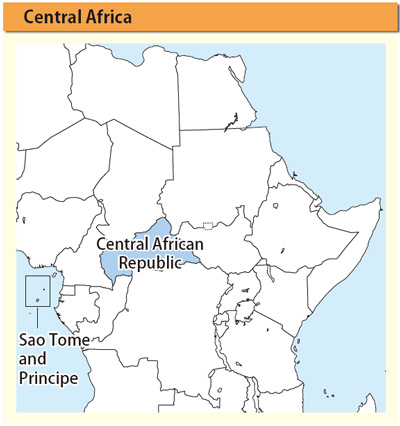
(4) West Africa
A. Sahel Region
“Sahel Eis an extensive region in the south of the Sahara and commonly refers to the region where Senegal, Mauritania, Mali, Niger, Burkina Faso, Chad, Nigeria and Cameroon are situated. In this region that connects North Africa and Sub-Saharan Africa, in addition to droughts and other natural disasters, threats of unstable elements such as poverty, threats of terrorism and illegal transaction of drugs, weapons, etc. are worsening.
Since the establishment of a new administration in 2013, Mali continues the fight against terrorism and is advancing domestic North-South peace negotiations with continuing support of the international society in 2014. In Burkina Faso, public backlash against the move to revise the constitution to enable the third term of the president developed into a riot and the Compaoré regime that had governed the country for 27 years marked its end in November. Now, a process toward the start of a democratic regime is in progress under an interim government. Nigeria is experiencing frequent acts of terrorism supposed to be conducted by the Islamic extremist called “Boko Haram Emostly in the north-eastern region of the country. Placing importance on the friendly relations with Mauritania and in light of the close partnership centered on fisheries, Japan sent Seigo Kitamura, member of the House of Representatives, as special ambassador to the president inauguration ceremony held in August 2014.

Japan has been steadily implementing the assistance it announced at TICAD V in 2013 for peace and stability, development and humanitarian improvement in the Sahel region. With the participation of international and domestic panelists specialized in the region, Japan held the “Japan-Africa Trade and Investment Forum relating to the Sahel Region E(Tokyo) in November 2014. About 130 people including Japanese companies Erepresentatives participated in the forum to discuss the security situation and future business development in the region.
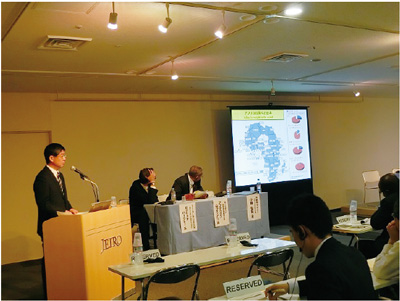 Japan-Africa Trade and Investment Forum relating to the Sahel Region (Tokyo, November 12, 2014)
Japan-Africa Trade and Investment Forum relating to the Sahel Region (Tokyo, November 12, 2014)
B. Other issues
(a) Guinea-Bissau
Guinea-Bissau had experienced repeated violence after gaining its independence. In 2012, a leading presidential candidate was captured by a part of the military during the election campaign. Later, an interim government was established with mediation by the Economic Community of West African States (ECOWAS) and others, followed by a presidential election from April to May 2014 electing President Vaz.
Japan welcomed the fact that presidential election took place in a peaceful manner with the participation of a large majority of the electorate and decided in August to resume the new bilateral economic assistance that had been suspended as a result of the incident in 2012.
(b) Ebola outbreak
After cases of Ebola virus disease were confirmed in Guinea in West Africa in March 2014, the infection spread to Sierra Leone in May and to Liberia in June. Later, cases of the infection were also confirmed in Nigeria in July, Senegal in August, the United States in September, Mali and Spain in October and the United Kingdom in December. As of December 31, 2014, the number of people infected in the three countries of Guinea, Liberia and Sierra Leone was 20,171 with the number of deaths reaching 7,890.
The Ebola outbreak became a major concern for the international community with the WHO declaring it a “Public Health Emergency of International Concern (PHEIC) Eon August 8 and the UN Security Council unanimously adopted Resolution 2177 calling for more assistance on September 18.
The Government of Japan, while providing information to and calling the attention of Japanese travelers and Japanese nationals overseas, has been seamlessly implementing wide-ranging assistance seamlessly not only to stop the spread of the epidemic and to provide treatment but also to prevent the disease and reconstruction of health systems with focus on the countries suffering from the epidemic (see Special Feature on page 171 for details).

<Ebola outbreak EThreat to international peace and prosperity Egt;
In 2014, the Ebola virus disease took thousands of lives mainly in Guinea, Liberia and Sierra Leone. This Ebola outbreak has been at an unprecedented scale and it spread to neighboring countries such as Nigeria, Senegal and Mali and caused secondary infection of doctors and nurses in Spain, the United Kingdom and the United States, posing major humanitarian, economic and political challenges to the international community.
As the number of cases increased rapidly in the three countries, the World Health Organization (WHO) declared it a “Public Health Emergency of International Concern Ein August. On September 18, the United Nations Security Council adopted, with Japan as one of the co-sponsors, Resolution 2177, the third resolution in its history concerning infectious diseases. The Resolution declared that “the Ebola outbreak constitutes a threat to international peace and security. EAlso, at other high level meetings such as the G20 Summit and the APEC Summit meetings in November, the international community reiterated its commitment to taking action to stem the Ebola outbreak.
There was also a concern about the outbreak’s significant economic impact on Africa. In September the IMF predicted a decrease in the economic growth of the affected countries, referring to the negative impacts on their major industries such as agriculture, services and mining. In a report released in October, the World Bank estimated that if the containment failed and the epidemic further spread, it would have resulted in an economic loss of up to 32.6 billion US dollars by the end of 2015. Africa as a whole, which was experiencing a fast economic growth since the beginning of this century, faced a big economic challenge due also to a decline in travel and trade caused by the continent’s “reputational damages Eas well as the recent decline in oil prices.
<Japan’s response>
In view of this Ebola outbreak, Japan, committed as “Proactive Contributor to Peace Eto contributing more actively to peace and prosperity of the world, has been playing a major role in the international community in response to the outbreak.
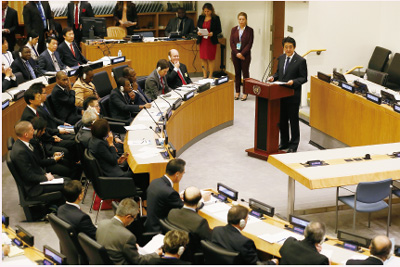 Prime Minister Shinzo Abe giving a speech at the United Nations High-level Meeting on Response to the Ebola Virus Disease Outbreak (September 25, New York, Source: Cabinet Public Relations Office)
Prime Minister Shinzo Abe giving a speech at the United Nations High-level Meeting on Response to the Ebola Virus Disease Outbreak (September 25, New York, Source: Cabinet Public Relations Office)
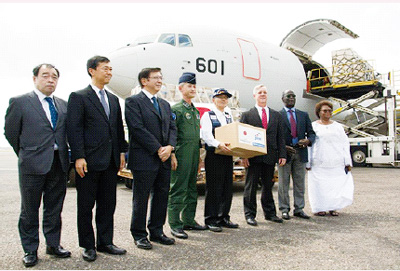 Delivery of PPE transported by a Self-Defense Forces aircraft (December 8, Accra, Ghana; Source: Ministry of Defense)
Delivery of PPE transported by a Self-Defense Forces aircraft (December 8, Accra, Ghana; Source: Ministry of Defense)
(1)Assistance EFrom ending the outbreak to rebuilding health systems E/h5>
Starting with rapid implementation of an emergency aid to Guinea in April 2014, Japan has been providing assistance seamlessly to the affected countries and international organizations. While many countries were announcing their Ebola responses, Japan put an importance on implementing the pledged aid as fast as possible in a visible manner. On September 25, at the United Nations General Assembly, Prime Minister Shinzo Abe announced an aid package of 40 million US dollars in addition to the various assistance already provided earlier. The allocation of this additional financial aid was decided on November 7, and all the measures and projects are already under implementation (as of January 2015).
In order to stem the outbreak, it is not enough only to put resources into Ebola treatment facilities which concentrate solely on the treatment of Ebola-infected patients. What is crucial is to implement meticulous preventive measures to contain the spread of the Ebola virus, including through paying attention to the places vulnerable against the virus, such as ordinary healthcare centers, general hospitals and rural areas, and strengthening preventive strategies to forestall infection in these places. As announced by Prime Minister Abe at the UN General Assembly, Japan has been providing personal protective equipment (PPE) so that infection at these places can be prevented. In response to urgent needs, Japan Self-Defense Forces aircraft delivered 20,000 PPE units to Accra, the capital of Ghana, where the UN Mission for Ebola Emergency Response (UNMEER) headquarters were located.
With regard to personnel contributions, Japan has been dispatching experts to WHO missions, contributing mainly to infection prevention at medical fronts. Japan has also seconded a Ministry of Foreign Affairs (MOFA) official with a medical license to the UNMEER. He is responsible for infection prevention and control, working as senior advisor to the UN Secretary General’s Special Representative (as of January 2015).
Inadequate health systems in the affected countries are considered to have caused the outbreak. The additional aid of up to 100 million US dollars, which was announced on November 7, aims not only at preventing infection but also at rebuilding health systems. Japan places importance on international cooperation in the health sector, has been promoting the universal health coverage (UHC), a concept at which everyone in need should have access to an affordable basic healthcare, and working regularly on strengthening West Africa’s health systems. Japan will continue to implement medium-to long-term measures based on the initiatives announced at the Fifth Tokyo International Conference on African Development (TICAD V), namely, a 500 million US dollar aid to the health sector in Africa and capacity building programs for up to 120,000 health workers in Africa.
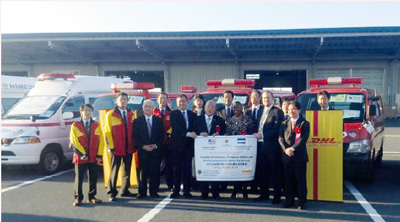 Ceremony for dispatching assistance materials for Ebola response to Liberia and Sierra Leone financed by the FY 2014 Grant Assistance for Grass roots Human Security (October 28, Narita International Airport)
Ceremony for dispatching assistance materials for Ebola response to Liberia and Sierra Leone financed by the FY 2014 Grant Assistance for Grass roots Human Security (October 28, Narita International Airport)
In addition, Japan announced that under certain conditions it would provide the drug developed by a Japanese company which might prove effective for Ebola patients, and supported the company’s clinical trial conducted with the French Institute of Health and Medical Research (INSERM), the Guinean Government, MSF (Doctors Without Borders) and other organizations (as of January 2015). Japan also provided the Japan-made high performance infrared thermography cameras to the countries neighboring the affected countries. These cameras can accurately measure body surface temperature without touching the body. Hence they contribute to safe quarantines at places such as airports and forestall possible reputational damages. Moreover, in order to quickly and safely transport patients infected with or suspected of having Ebola virus to quarantine and treatment facilities, Japan supported the delivery of ambulances and other equipments donated by Japanese local governments. Japan has been providing not only financial aids, but also a variety of assistance measures, including through cooperation with private sector.
Japan’s Response to Counter the Ebola Outbreak in West Africa
(Total amount of US$155 million) �E�Es of February 10, 2015)
(1)Emergency grant aid�E�approx. US$42.0 million
(2)Emergency donation of aid supplies: approx. US$0.9 million
(3)Contribution to international organizations: approx. US$2.2 million
(4)Personnel dispatch: 14 Japanese experts in the WHO missions
(5)Grant assistance for grassroots / human security projects: approx. US$0.8 million
(6)Personnel protective equipment (PPE): approx. 700,000 sets
(7)Additional assistance for rebuilding health systems: maximum of US$100 million
(2)Countermeasures to reputational damages EAvoiding isolation of the affected countries E/h6>
There also exist other forms of Ebola outbreak’s emerging negative effects on the international community. With an increasing awareness that the outbreak is an issue of international concern, people started to avoid travelling not only to the affected countries but also to other African countries with no case reported, and non-African companies started to scale down their trade with and investment in Africa. The number of travelers decreased even in Eastern and Southern African countries, even though they are distant from the affected countries. At the G20 Summit meeting in Brisbane, President Sall of Senegal raised an issue of negative impact on economy by “unfair generalization, Epointing out that the whole African continent is being treated as if it is affected by the Ebola outbreak.
We must avoid a situation where the affected countries are forced to suffer isolation and negative economic impacts, and should continue working hand in hand with Africa towards its development, based on the basic principle of TICAD. For this reason, the Government of Japan has been proactively sharing accurate information and stressing the need to act rationally in accordance with facts.
Japan, as a nation contributing proactively to international peace and prosperity, and as a nation having taken a lead in the discussions on international health issues through the G8(G7), the TICAD and other processes, will continue to play an essential role in ending the current Ebola outbreak and preventing its resurgence.

